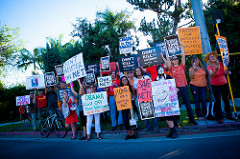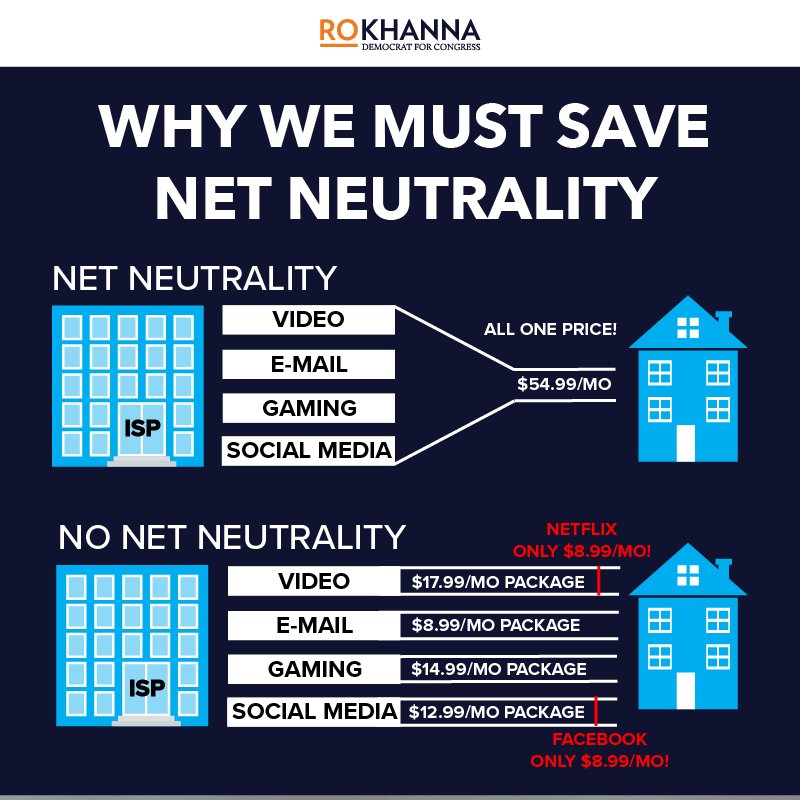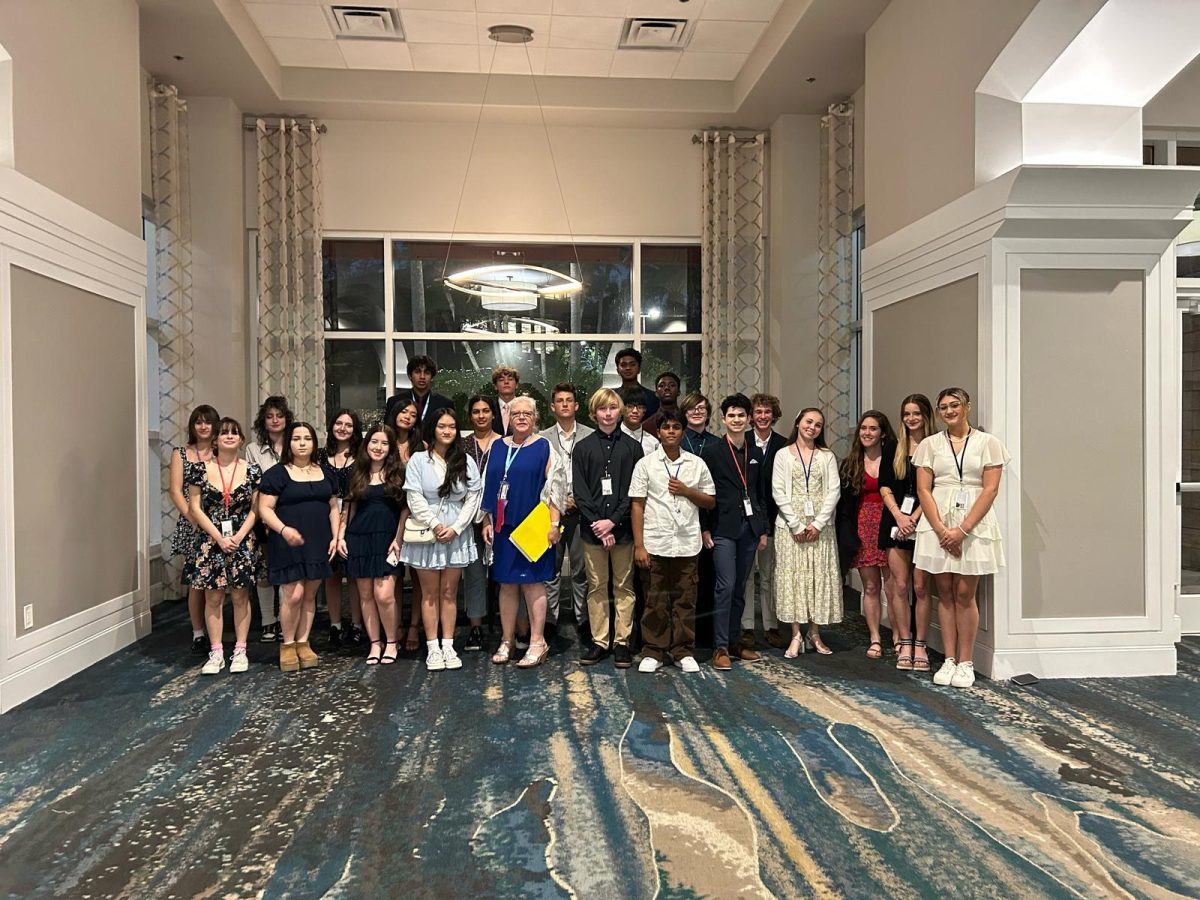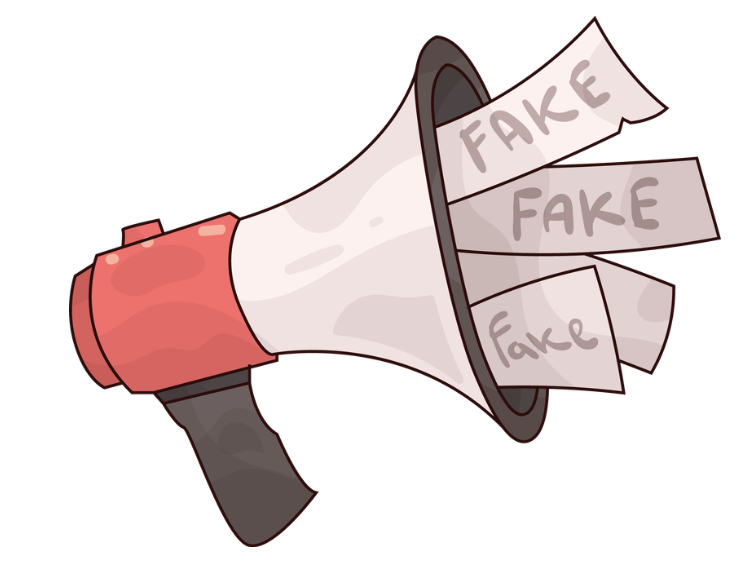Politics Today: Saving Net Neutrality
We deserve an open, free internet. The FCC seems to disagree.

Photo Stacie Isabella Turk
Protesters raise signs in favor of net neutrality at a protest in 2014.
December 6, 2017
RHSToday.com is excited to introduce a new blog, Politics Today. This blog will discuss the important political issues going on in the world today. This first segment includes a discussion on an important issue that will likely affect everyone’s internet use.
Sorry, this article has been blocked by your internet service provider. Pay $49.99/month for the Premium News Package to view this article.
Just kidding. We live in America, land of the free internet– for now. Welcome to the world of net neutrality.

Net neutrality is, according to FCC commissioner Jessica Rosenworcel, in an op-ed for the LA Times, “the right to go where you want and do what you want on the internet without your broadband provider [companies like Verizon, AT&T, or Spectrum that provide internet] getting in the way. It means your broadband provider can’t block websites, throttle services or charge you premiums if you want to reach certain online content.”
Basically, it’s the legal reason why you don’t have to pay an additional fee to use Instagram or Netflix. But, if everything goes according to plan for Ajit Pai, the FCC chairman appointed by President Trump in January, we could soon be paying an additional fee to stay up late watching YouTube videos.
This may all seem like a dream. They can’t really take away our internet, right? Well, around the world net neutrality has become already become a thing of the past. Currently, in Portugal, customers are already paying for additional packages for social media, messaging apps, email, news, etc.
Removing our right to net neutrality isn’t just a way to make money, it can often be a way to limit freedom of speech. Companies would now be allowed to choose what content they want us to see. Whether this is through them slowing down sites with opposite opinions or charging consumers more to view these sites, the internet could soon become a political wrestling ring where the richest opponent wins.
Former FCC Commissioner Michael Copps stated, “This is a first amendment issue; it’s free speech versus corporate censorship.” He’s right; we will no longer be able to choose where we want to see our news or read opinions other than what the companies decide.
The worst part is that this is a battle that we thought we had already won. In 2015, the same exact issue came up for discussion– should net neutrality be a legal guarantee? Then-FCC Chairman Tom Wheeler released rules that would allow for ISPs to charge companies in order to be given a priority to their service. This would allow, for example, for Netflix to pay Verizon more money so that it could be streamed faster than its competitors.

According to the Free Press, the leading organization behind this issue, last year when the original proposal was being decided on, over four million people contacted the FCC, over 60 members of Congress spoke out, and President Obama, after seeing the public outrage, called Wheeler and told him to reclassify the issue under Title II, which would essentially protect our rights to a free internet. There was even a “Day of Action to Save Net Neutrality”, where on July 12 hundreds of businesses like Netflix, Twitter and Dropbox posted banners on their website urging users to act against the net neutrality proposal.
A few months later, the Free Press stated, “Wheeler confirmed that he would use Title II to give internet users the strongest protections possible. The full Commission approved his proposal… marking the biggest victory for the public interest in the FCC’s history.” Now, two years later, we are facing this issue again, being decided by five individuals who will dictate how the internet of 325 million Americans runs.
This entire situation is not only disappointing and unfair, but it’s a clear violation of rights. We don’t make it cheaper to travel to bigger corporations in the real world. It isn’t cheaper to visit Target than Publix. You don’t pay a fee to walk into Publix and not Target. Therefore, it shouldn’t be cheaper to visit Target.com over Publix.com. According to the proposal that will end net neutrality, the initiative will “eliminate the vague and expansive Internet Conduct Standard, under which the FCC micromanaged innovative business models. ” I don’t know about you, but if the FCC needs to “micromanage” the internet to ensure my freedoms, then they should feel free to do so. I welcome it.
If you agree with the opinion above and want to save net neutrality, there is a couple of ways to help. There is a protest being held at the Verizon on Dale Mabry on December 7. You can call members of Congress and let them know how you feel about Net Neutrality. Websites like Save the Internet, run by the Free Press, and Battle for the Net allow you to enter your number and they will call you and connect you to your local representative. They will even provide a script for you to follow. Email the FCC Chairman responsible for this proposal here. Whatever you choose to do, don’t do nothing. Five minutes of your time now can save you 20 minutes of waiting for a page to load in the future.










